News
North central zone stakeholders propose 35% revenue allocation to states

- Want FG to have 39%, LGs 26%
Majority of the states in the North central zone have proposed a 39: 35: 26 per cent revenue sharing formula for the federal, state and local governments respectively.
The states made their positions known at a one-day North Central Zonal public hearing on the review of the current Revenue Allocation Formula (RAF), organised on Thursday by the Revenue Mobilization Allocation and Fiscal Commission (RMAFC), at Government House, Lokoja.
In his remarks, Gov. Yahaya Bello of Kogi, advocated a sharing formula of 39, 35 and 26 per cent between the Federal, States and Local Governments, respectively, in order to effect the desired development of the country.
Bello, who was represented by his Deputy, Edward Onoja, stated that the main objectives of revenue allocation was to promote national unity and accelerate the economic growth of all tiers of government.
He lamented that the current formula in use had failed to achieve the desired aspirations of the citizens for development.
“We can no longer deny that a comprehensive review of RAF currently in use in Nigeria had become overdue.
”Currently, the Federal Government takes 52.68 per cent, the 36 states and the FCT split 26.72 percent and the local government councils make do with 20.60 per cent.
“The nine oil producing states receive an additional 13 per cent as derivation revenue which is distributed among them depending on the actual contribution of each to crude oil receipts.
“Existential realities between the three tiers of government today necessitate a more equitable sharing plan for all revenues accruing into the federation account,” Bello said.
He, therefore, urged the review committee to take a critical look at the revenue allocation formula currently in use with a view to do the needful in the interest of Nigerians.
The News Agency of Nigeria (NAN) reports that the representative of Plateau state proposed a 40, 35 and 25 per cent formula, while Nasarawa state advocated 44, 35 and 21 for the three tiers of government, respectively.
Also speaking, the Commissioner for Land, Survey and Solid Minerals, Mr Bernard Unenge, who made the presentation on behalf of the Benue state government, advocated 30, 45, and 25 per cent for federal, states and local governments, respectively.
On her part, the Kwara State Commissioner for Finance, Mrs Florence Oyeyemi, in a virtual presentation, advocated a 33, 30 and 27 per cent sharing formula, respectively.
Dr Joel Akowe, on behalf of the Academia, proposed 30, 35 and 20 per cent respectively, while proposing a 15 per cent allocation to a Special Fund.
The Representative of the Network of Kogi state Non Governmental Organisations (KONGONET), Mr Muraina Idris, proposed 40, 27 and 33 per cent respectively, as he argued that this formula would enable the federating units and constituents to receive more attention in terms of development.
He added that over the years, the state governments had not really shown the need for increased resources as the community of civil society feels that a huge gap had existed between resource allocation and development, across majority of the federating units.
Idris further said that their proposed allocation of 33 per cent to local governments, would reduce rural-urban migration, create employment, promote development in rural areas and improve security.
For the Vice President, National Council of Women Societies (NCWS), Kogi branch, representing women, the three tiers of government should receive allocations in the ratio of 30, 34 and 23 respectively, but that the 13 per cent derivation for oil producing states be retained.
Mr Victor Ibrahim, who spoke on behalf of the Kogi Chamber of Commerce, Industry, Mines, and Agriculture (KOCCIMA), proposed 36, 33 and 26 per cent revenue formula, but on the condition Nigeria would practice true federalism.
Ibrahim said this had become necessary because the nation had been engaged in a unitary system of government, which had hindered development at the grassroots.
Mr Yahaya Ibrahim, the National Chairman, Persons Leaving With Disabilities (PLWDs), proposed 39, 29 and 32 per cent for the three tiers of government, respectively.
He specifically appealed to the Federal Government to however support the Kogi government, in its bid to empower the PLWD in the state.
The chairman cited Gov. Yahaya Bello for commendation, for according PLWDs in the state priority in terms of inclusiveness in governance, empowerment, among others.
Earlier, in his address of welcome, the Chairman of RMAFC, Elias Mbam, said the commission had been empowered by the Constitution to review, from time to time, the RAF and principles in operation to ensure conformity with changing realities.
This was by virtue of Paragraph 32(b), Part 1 of the Third Schedule to the 1999 Constitution of the Federal Republic of Nigeria (As Amended), he said.
The chairman disclosed that for the review, additional relevant data had been collected from relevant government agencies, and studies on fiscal matters relating to revenue allocation had also been undertaken.
He said that the public hearing was the fourth in the series, as the commission had earlier undertaken similar exercises in the South-West, South-South and South-East Zones.
Mban said plans had also been concluded to conduct the hearing in the remaining two geo-political zones of the North-West and North-East.
He said, “I wish to use this opportunity to invite all Nigerians to please participate and make contributions to this review process.
“It is our belief that your contributions will certainty enrich the process and ensure that the new revenue allocation formula reflects the wishes and aspirations of Nigerians.”
News
ICPC, NRC Forge Anti-Graft Alliance to Safeguard Rail Assets
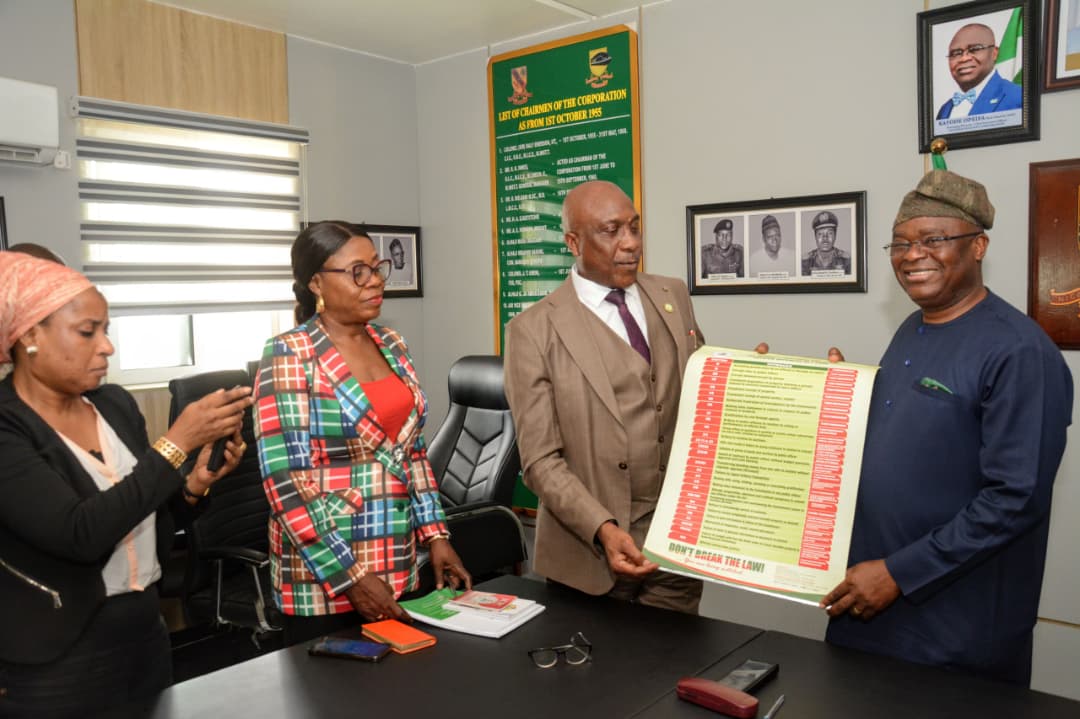
ICPC, NRC Forge Anti-Graft Alliance to Safeguard Rail Assets
The Independent Corrupt Practices and Other Related Offences Commission has pledged closer collaboration with the Nigerian Railway Corporation to strengthen transparency and accountability in the country’s rail sector.
The Resident Anti-Corruption Commissioner (RAAC), Lagos Office, Mr. Alexander Chukwumah, gave the assurance during a courtesy visit to the NRC Managing Director, Dr. Kayode Opeifa, at the corporation’s headquarters.
Chukwumah said the commission was prepared to support the NRC through targeted training programmes aimed at equipping staff with the knowledge to identify and avoid actions that could expose them to corruption-related offences.
He explained that the initiative aligns with the ICPC’s public education mandate to promote integrity across public institutions.
He urged the management of the corporation to work closely with its Anti-Corruption and Transparency Unit, noting that members of the unit had been trained to detect early warning signs and red flags capable of preventing minor lapses from escalating into major institutional crises.
According to him, the visit was also to reinforce the cordial relationship between both agencies and reciprocate the goodwill earlier extended by the railway corporation.
“ICPC is committed to ensuring that NRC workers stay out of trouble. There are ways we can guide you and your team to avoid actions that could expose them to corruption risks,” Chukwumah said.
In his response, Opeifa welcomed the partnership and expressed readiness to deepen collaboration with the anti-graft agency to entrench transparency within the corporation.
The NRC boss observed that the railway system could have achieved greater milestones over the years but for corruption-related setbacks that slowed its growth.
He requested the commission to organise a capacity-building programme for heads of departments and senior management staff to sharpen their understanding of compliance standards and ethical decision-making.
Opeifa identified vandalism of railway infrastructure as a major operational challenge, stressing that the destruction of critical assets continues to strain service delivery.
As part of efforts to curb the menace, he presented anti-vandalism sweatshirts to the ICPC delegation bearing the inscription: “Rails and railway assets are critical national treasures and not scraps.”
He maintained that the corporation operates a strict disciplinary regime, warning that any staff found culpable of collusion or sabotage faces immediate dismissal.
He also commended NRC engineers and other personnel for sustaining operations despite logistical and infrastructural challenges.
On the corporation’s long-term direction, Opeifa reiterated the NRC’s Vision 2-5-10-20 development framework aimed at modernising and expanding the rail network.
He said the first phase prioritises optimising legacy lines and reviving abandoned corridors that once served as economic lifelines, including the Kaduna–Nguru–Kaura Namoda route, with plans to restore services to Zamfara State within the year.
He added that the corporation is advancing a freight-by-rail drive under its “Railing with the States” initiative to enable sub-national governments leverage rail infrastructure for economic growth and enhance connectivity to the nation’s seaports.
Opeifa further disclosed that the NRC plans to gradually transition from diesel-powered locomotives to cleaner energy sources such as gas within the next five years, subject to funding, while working towards doubling Nigeria’s rail assets by 2035.
News
Tinubu swears in Disu as substantive IGP, chief inaugurates up state police committee

Tinubu swears in Disu as substantive IGP, chief inaugurates up state police committee
President Bola Tinubu on Wednesday swore in Olatunji Disu as the substantive Inspector-General of Police at the Council Chambers of the State House, Abuja, as the new police chief immediately inaugurated a committee to drive the implementation of state policing.
Disu took the oath of office at 2:53pm after his citation was read by the State House Director of Information and Public Relations, Mr Abiodun Oladunjoye.
The brief ceremony, witnessed by Vice President Kashim Shettima, members of the Federal Executive Council and other top government officials, preceded the FEC meeting, which commenced at 3:01pm.
Among dignitaries present were the Secretary to the Government of the Federation, George Akume; National Security Adviser, Nuhu Ribadu; Chief of Staff to the President, Femi Gbajabiamila; Minister of Police Affairs, Ibrahim Gaidam; FCT Minister, Nyesom Wike; and Head of Service, Mrs Esther Walson-Jack.
The President also swore in newly appointed commissioners of the Revenue Mobilisation Allocation and Fiscal Commission and the Federal Civil Service Commission.
Disu’s confirmation followed his unanimous endorsement by the Nigeria Police Council on Monday, barely a week after Tinubu appointed him acting IGP in the wake of the resignation of his predecessor, Kayode Egbetokun, on February 23, 2026.
At Monday’s Police Council meeting, Lagos State Governor, Babajide Sanwo-Olu, reportedly commended Disu’s track record, particularly his tenure as Commander of the Rapid Response Squad in Lagos between 2015 and 2021.
Nasarawa State Governor, Abdullahi Sule, also described the appointment as merit-based, while Enugu State Governor, Peter Mbah, seconded the motion endorsing him.
Disu, 59, joined the Nigeria Police Force as a Cadet Assistant Superintendent of Police on May 18, 1992. Before his elevation, he served as Assistant Inspector-General of Police in charge of the Special Protection Unit and the Force Criminal Investigation Department Annex in Lagos. He previously held key roles in Lagos and Rivers states.
Hours after his inauguration, the new IGP held his first formal engagement with senior officers, during which he announced the constitution of an eight-member committee to oversee the implementation of state policing.
Professor Olu Ogunsakin was named chairman of the committee.
Addressing the force hierarchy, Disu said leadership was “not about position but responsibility,” stressing that professionalism, discipline and accountability must guide policing nationwide.
He underscored the need for restraint in the exercise of authority and respect for human rights, insisting that all Nigerians must be treated with dignity and fairness irrespective of status.
The IGP also pledged to strengthen internal oversight mechanisms, directing that the Public Complaint Unit and the X-Squad be empowered to operate independently.
On decentralisation, Disu said state policing would enable different tiers of government to play more active roles in addressing security challenges across the country.
News
Tinubu names ‘Tax man’ Taiwo Oyedele minister of state for finance

Tinubu names ‘Tax man’ minister of state for finance
President Bola Tinubu has nominated Taiwo Oyedele as the minister of state for finance, replacing Doris Anite-Uzoka.
Mrs Anite-Uzoka will now move to the Ministry of Budget and National Planning, as the Minister of State, her third portfolio in the administration.
President Tinubu today conveyed the nomination of Mr Oyedele to the Senate for confirmation in a letter to the Senate President, Godswill Akpabio.
Until President Tinubu nominated him as a minister, Mr Oyedele from Ikaram, Akoko, Ondo State, was the chairman of the Presidential Committee on Fiscal Policy and Tax Reforms, which overhauled Nigeria’s tax system.
Mr Oyedele, 50, is an economist, accountant and public policy expert.
He attended Yaba College of Technology, where he obtained a Higher National Diploma (HND) in accountancy and finance. He attended Oxford Brookes University and earned a BSc in applied accounting.
He also completed executive education programmes at the London School of Economics, Yale University, the Gordon Institute of Business Science, and the Harvard Kennedy School.
Mr Oyedele spent 22 years of his working career at PwC, joining in 2001 and rising to become the Fiscal Policy Partner and Africa Tax Leader.
Mr Oyedele is also a professor at Babcock University in Ogun State and a visiting scholar at the Lagos Business School.
Bayo Onanuga,
Special Adviser to the President,
(Information and Strategy)
March 3, 2026
-
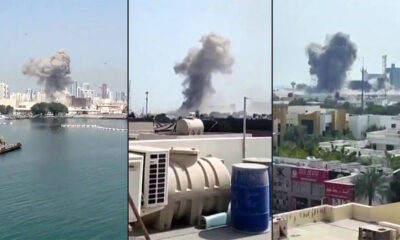
 International3 days ago
International3 days agoIran Retaliates: Gulf States Allied With US Hit by Missiles, Drones
-

 International3 days ago
International3 days agoSeveral U.S. Warplanes Crash in Kuwait Amid Ongoing Iranian Strikes
-
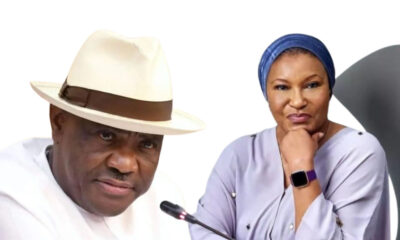
 Politics3 days ago
Politics3 days agoWike Blasts Kingibe Over FCT Council Election Remarks
-

 International3 days ago
International3 days agoIsraeli Airstrikes Kill 31 in Lebanon as Hezbollah Loses Senior Figures
-

 Health3 days ago
Health3 days agoNigeria to Receive Breakthrough HIV Prevention Drug This Month – NACA
-
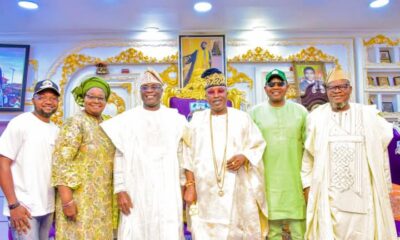
 News2 days ago
News2 days agoRelief Radiant Hearts Foundation Launched in Iwo, Promises Hope for the Vulnerable
-
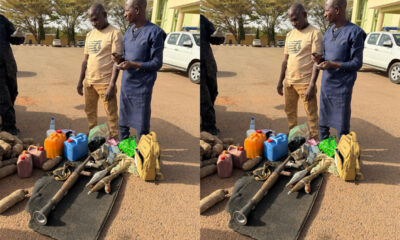
 metro2 days ago
metro2 days agoDSS Busts Alleged Arms Trafficking Network in Gombe, Seizes RPGs
-
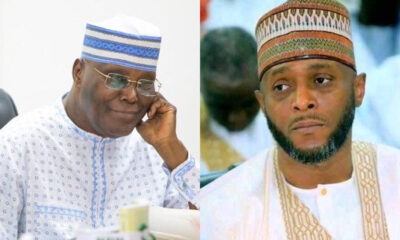
 Politics2 days ago
Politics2 days agoAtiku’s Son Resigns as Adamawa Commissioner Following Fintiri’s APC Defection





